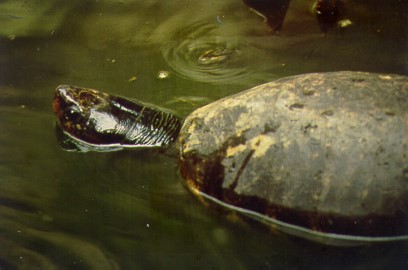
Kanitha Krishnasamy
Director - Southeast Asia
Securing Malaysian Skies – Combatting Wildlife Trafficking via Air
For some time now, Malaysians have watched in alarm as bag after bag of smuggled wildlife evaded detection at two of the country’s busiest airports, only to be discovered at destination airports, particularly across India.
Just over a week ago, it was eight wild animals in the luggage of two passengers who flew into Chennai from Kuala Lumpur. Four of the animals are a type of gibbon found nowhere else in the world except Borneo. For two of these Endangered Eastern Grey Gibbons, the rescue came too late – they had died by the time they were found.
This kind of smuggling from both terminals of the Kuala Lumpur International Airport (KLIA) to various locations in India has been persistent, frequent, sometimes in large quantities and involving a wide variety of species.
To illustrate the point, consider that in the last four months of 2024 alone an estimated 10,000 live tortoises and turtles, endangered primates such as Siamangs and Agile Gibbons, as well as bats, iguanas, and bearded dragons—wildlife all illicitly trafficked via flights departing Malaysia – seized at airports in India.
So, it with great relief that TRAFFIC welcomes recent statements by ministers of Natural Resources and Environmental Sustainability (NRES) and Transport (MOT) on this issue. Actions to address the problem must be fast-tracked if, as reported by local and Indian media, Malaysia continues to attract Indian travellers due to favourable tourism policies and increased flight connectivity.

This is not simply a wildlife conservation issue. It is also about the abuse of Malaysia’s airports and airlines for criminal activity. It is about compromised safety of airports and travellers when the smuggled wildlife is venomous or dangerous, and a public health concern as wildlife can harbour diseases.
Not least, it is about the country gaining an unsavoury reputation as an easy gateway for wildlife trafficking.
Malaysia has notched a few enforcement successes and TRAFFIC congratulates the authorities on their most recent busts involving 4,300 live baby Pig-nosed Turtles bound for Viet Nam in February and five Asian Koels headed to Indonesia earlier this month, the latter which resulted in a fine of MYR50,000 to the offender.
But for the most part the discoveries of incidences between Malaysia and India have been made at Indian airports after wildlife-filled bags slipped past checks in Malaysia.
That’s why NRES Minister Nik Nazmi Nik Ahmad’s acknowledgment of KLIA’s high risk for wildlife smuggling, along with Transport Minister Anthony Loke’s recognition of the issue's severity, highlights Malaysia’s awareness of vulnerabilities in monitoring and preventing wildlife smuggling through air travel.
Minister Nik Nazmi has pledged to intensify enforcement efforts, emphasizing multi-agency and internationally cooperative approaches to curbing wildlife crime. Meanwhile, Transport Minister Anthony Loke announced upgrades to KLIA’s luggage screening machines and instructed airport operator Malaysia Airports Holdings Bhd to enhance surveillance and screening processes.
These are encouraging, but more is needed to put criminal networks using KLIA out of business. For an effort of this magnitude to work, approaches must be coordinated and involve government agencies and private companies working along the transportation chain. Crucially, there must be more leadership from all parties that have a role in making airports safe for everyone. It needs a whole-of-government approach. And it needs a champion – an agency capable of gathering stakeholders, fostering dialogue, and driving long-term action and impact.
There are many gaps enabling illegal wildlife trade across Malaysia’s borders. It was among challenges raised by the hundred law enforcement officers and transport sector players that TRAFFIC brought together last August to discuss wildlife trafficking at Malaysian land, sea and air borders.
What did the 30 agencies and transport sector organisations at the Unite: Combatting Wildlife Trafficking at Malaysian Borders Roundtable think was key to combatting the problem?
They said:
better intelligence-sharing mechanisms between enforcement agencies and with the transport sector, advanced scanning technology, cross-sectoral training programmes and collaboration, and more effectively holding traffickers legally and financially accountable.

In his opening address at the Unite Roundtable, NRES Deputy Minister Dato’ Sri Huang Tiong Sii warned that seizures alone could not be considered a complete success as it showed the extensive removal of wildlife from nature. He too wanted to see more enforcement agency-transport sector collaboration.
From our own 30-year experience of researching wildlife crime and supporting wildlife crime fighting efforts in Southeast Asia, TRAFFIC urges that surveillance protocols at key transportation hubs be enhanced, and training for all enforcers and airport and airline operators on the latest trafficking tactics is continuous rather than sporadic. We stand ready to collaborate on this important issue.
Finally, we advocate for timely intelligence-sharing and joint investigations at the national and regional levels to ensure that smuggled wildlife does not take flight from Malaysia’s airports. It is time to act decisively.
Notes:
Kanitha Krishnasamy is director of TRAFFIC in South-east Asia. TRAFFIC is a leading non-governmental organisation working globally on trade in wild animals and plants in the context of both biodiversity conservation and sustainable development, whose mission is to ensure that trade in wild plants and animals is not a threat to the conservation of nature.



